- Home
- John Bellairs
Drum, the Doll, and the Zombie Page 8
Drum, the Doll, and the Zombie Read online
Page 8
Johnny swallowed hard. "What else are we fighting?" he asked.
The professor grimaced. "After Charley was hospitalized, the old hag slipped into his room and concealed a knotted cord in his pillow. As the cord grew in power, our friend's mind grew weaker. Now he is in a coma, and that means that the evil creature in his pillow has done its work. So Charley is in much greater danger than your grandmother was. We could splatter the pillow monster with holy water. That might even kill the creature. But since it has already absorbed Charley's mind, he would never come out of his coma. I have to learn how to deactivate the monster before I attempt to deal with it. However, in an odd way I believe that Charley is safe."
"Professor," asked Johnny, "what do you mean, safe? He's lying there helpless—"
Professor Childermass raised a finger. "Ah, but he is still alive," he said. "I have been following the events in St. Ives in the newspapers, Johnny, and they are very interesting. General LeGrande, the dictator, is holed up in his palace. The peasants—the ordinary people of the island—are revolting against his corrupt rule. And for the first time, they are winning battles. Do you see what that means?"
"No," said Johnny, knowing that the professor would tell him.
"Well, it means that without the drum, the LeGrande family has lost its grim hold over the island. The only person who knows where the drum is hidden is Charley. Mama Sinestra cannot be sure who has the drum— maybe you, maybe I, maybe Charley—and since she can't take a chance on killing the one person who might lead her to the drum, she'd never dare do Charley in."
"What if she gets the drum back?" asked Johnny.
The professor shook his head. "Then God help all of us. We have to prevent that at all costs."
And that was all he would say for the time being. Days passed without Mama Sinestra showing up again. The newspaper made a big row about the "vandalism" at Rest Haven Cemetery. According to the story, someone had dumped the bones of one Rafael Famagusta (1845-1907) out of his coffin and had used a truck to yank the bronze doors off the mausoleum. The paper called for stricter vigilance.
Johnny, Father Higgins, the professor, and Fergie were all vigilant enough, but no one saw the slightest sign of the old sorceress. "We got her on the run," said Fergie, though the others were not so sure. Meanwhile, the professor continued his research, and by mid-December, he thought he had found a way to deal with Charley's problem. They all met again in the professor's study, which had reverted to its ordinary messy condition. The professor had been in touch with Todd Lamort, who reported that Dr. Coote still lay unconscious. Professor Childermass proposed that he, Fergie, and Johnny go up to Portsmouth to deal with the hex on Dr. Coote. Meanwhile, Father Higgins would live in the professor's house and keep a watch on the Dixons across the street—just to make sure that Mama Sinestra didn't try any more tricks.
"I think having a priest nearby would give her second thoughts," the professor finished. "And I believe that the boys and I can handle whatever horror we find in Portsmouth. I wouldn't even take the two of you, mind, but I have a rotten feeling you'd sneak along anyway."
"Now, Prof," said Fergie with a broad, innocent grin, "whatever makes you say that?"
Professor Childermass did not smile. "If you go, Byron, you will consider yourself under my orders. You will do what I say, and if I don't say it, you won't do it. Is that clear?"
For once, Fergie's smart-alecky manner disappeared. "Sure," he said. "You got my word on it, Prof."
"Gentlemen," the professor said, "I want you both to bear in mind one thing. This is a matter of life and death. Your lives. And, God forbid, your deaths!"
CHAPTER ELEVEN
The last day of school before the new year would be Friday, December 17, and as the Christmas vacation drew closer, Johnny grew more and more nervous and troubled. Part of his worry, of course, had to do with the trip he, Fergie, and the professor were taking to Portsmouth on the first Saturday of the Christmas break. Johnny was all too aware of the danger that might lurk. The other part of his worry came from Major Dixon's approaching departure and Johnny's decision about whether he wanted to stay in Duston Heights or move with his father to Atlanta. It was a tough choice, and Johnny felt torn by it. The last week he had gone to St. Michael's Church every afternoon to pray for guidance, but he realized that in the end he alone would have to choose.
He had tried to talk the matter over with the professor, but the old man had his own deep worries, as did Father Higgins. Fergie was not much help either. When Johnny brought the matter up, Fergie made a face. "Aw, Dixon, you know you belong in Duston Heights," he said. "Who else can teach you to play baseball, an' who else can keep me humble by beatin' me at chess?"
But that was not enough for Johnny, even though he had to admit he would miss Fergie terribly. Fergie had become the very best friend he had ever had. Even so, Johnny felt that he needed unbiased advice, not Fergie's wisecracks. With the professor, Father Higgins, and Fergie unable or unwilling to advise him, Johnny became more and more upset. In a way it was almost a relief when Saturday morning came and he once again got into the professor's maroon Pontiac for the drive north. Three or four snowstorms had covered Duston Heights with a crusted layer of snow. The streets were clear, though, and the professor had put snow tires on his car, so they were ready for any weather. Professor Childermass stopped in Cranbrook, the snooty section of Duston Heights, where Fergie lived. Fergie came out lugging his plaid suitcase, and he clambered into the backseat of the car next to Johnny. Fergie's dad, a mild-looking, balding man who sold Bibles, shoes, and kitchen ware door to door, came out to wave good-bye, and Fergie gave his father a jaunty salute. Then the three of them sped away on their mission.
As they drove to Portsmouth, the professor explained what he intended to do. The danger, he said, was that the cord that Mama Sinestra must have placed in Dr. Coote's pillow had turned into a fully developed monster that had fed off Dr. Coote's conscious mind, his soul, which the voudon priests called the gros bon ange. What kept Dr. Coote alive was the spirit of life itself, or the ti bon ange. If the creature that Mama Sinestra created were simply destroyed, then Dr. Coote's soul would not be able to return to the old man's body, and he would exist like a vegetable for the rest of his life.
So the professor could not simply splash the feathery horror with holy water, as Father Higgins had done with the one from Gramma's pillow. Instead, he would have to perform a certain ritual that would separate the creature from Dr. Coote's psyche. That would be dangerous, because without a human mind to occupy and control it, the beast would be free to attack anyone it pleased. If he completed the ritual correctly, however, the professor would hold the uncanny creature captive inside a spell of his own. The professor had brought along with him a black leather valise with crumbling corners and rusty hinges, something like a doctor's bag. Inside were some magical implements that he had borrowed from his friend at Miskatonic University, which he hoped would help him set Dr. Coote free of the awful enchantment.
Fergie listened as the professor talked, and then he said, "Swell, Prof. So what do me an' Johnny do? Stand guard with our holy-water sprinklers an' douse the critter if it acts up?"
"No," Professor Childermass said sternly. "I definitely do not want that. Byron, you and Johnny will have to stand guard, all right—but outside the door of the hospital room. I will have to use all my concentration to make sure I can control this—this whirlamadoodle from the infernal regions. If I have to worry about you, Johnny, and Charley all at once, then I may very well become distracted, and that would be fatal for everyone."
"Aw, Prof," objected Fergie. "You know we can take care of ourselves."
Professor Childermass set his mouth in a stubborn line. He clammed up, but as he drove, he thought about the problem. He had told the boys only half of his motives for taking them along. It was true that the three of them had shared some wild adventures, and equally true that he valued their companionship and moral support. However, it was also true
that he was afraid to leave them in Duston Heights.
He had not told anyone else, but the professor had called the police in Duston Heights, Portsmouth, and Durham. He had described Mama Sinestra to them and had suggested that she was a deranged and dangerous character. All had promised to keep an eye out for her, but so far she had not been seen. As long as he did not know where Mama Sinestra was, the professor preferred having Johnny and Fergie with him—at least, he thought, she wouldn't get a crack at them in Duston Heights while he was prancing around like some witch doctor in Portsmouth. However, he had no intention of exposing Fergie and Johnny to the dangerous possibility of the ritual's going wrong, so he pondered about what he could do to insure that the boys were safe.
He still had not solved the problem when he drove the Pontiac into the parking lot of Mercy Hospital. He picked his black bag up from the passenger seat and then groaned as they all stepped out of the car into the slush. "Look at this," he said, his voice angry. "These Portsmouth people don't even scrape out the parking lots. They just throw rock salt all over everything to get rid of the snow. Disgraceful!"
"What's wrong with that, Prof?" asked Fergie. "I mean, the salt melts the snow anyway, right?"
Professor Childermass glared at Byron. "Oh, yes, in-deedy, it melts the snow. And when a car goes rolling through this slush and mush, the salt flies up against the frame. And then what happens, my fine feathered friend?"
"Uh—you get a car that tastes like a pretzel?" teased Fergie, who knew the answer very well.
"No!" exploded the professor. "You get rust, rust, rust! Also known as ferrous oxide! And what does rust do to a car? It destroys it! All because these cheapo New Hampshirites are too tightfisted to invest in a couple of road scrapers! If I had them here right now, I'd—"
"Professor," pleaded Johnny, "we have to be quiet in the hospital!"
Professor Childermass noticed then for the first time that they had walked into the lobby of the hospital, where people sitting in chairs were looking at him curiously. He glared back with defiance. "If any of you people work for the government department that salts the streets here," he said in a quiet but furious voice, "you should be ashamed of yourselves!" Then he stalked over to the nurses' station and signed himself and the boys in as visitors.
They went upstairs, with Fergie wondering aloud where they did amputations and autopsies. Johnny elbowed him in the ribs. "Be quiet, won'tcha?" he muttered. "You're gonna make them throw us out!"
Fergie piped down, though he was still grinning mischievously. When they opened the door of Dr. Coote's room, Todd Lamort, who was sitting in a chair next to the bed, glanced up from the book he had been reading. Dr. Coote looked awful. He had lost weight, and his usually fluffy white hair was pasted against his head. His eyes were closed and his wide mouth was slightly open. Strips of white adhesive tape held a tube in place inside his left nostril. He wore striped pajamas, and his long, bony arms lay on top of the blanket, the knotted old hands half clenched. Johnny had to glance away. Dr. Coote looked like a dying man.
"Hello," whispered Todd Lamort. "I didn't know you were coming."
"It's kind of a spur-of-the-moment visit," replied Professor Childermass, setting his black bag down at the foot of the hospital bed. "How has he been?"
Lamort shook his head sadly. "Every once in a while he will mutter and groan, but he doesn't recognize anyone, and he won't talk to me, no matter how hard I try to get him to speak."
"Hm," said Professor Childermass. "I hate to see poor Charley in this dreadful state. Have you had any more trouble at his house?"
"No," replied Lamort. "I've been staying in the guest room, because that drippy toilet keeps me awake. No one has tried to break in, and everything has been very quiet."
The professor nodded. "It's kind of you to stay there," he said. "And to visit Dr. Coote. I know he would want to thank you if he could."
Lamort gave an embarrassed sort of smile. "Well, it's the least I could do," he murmured. He stretched and yawned. "I think I will leave now that you are here. I have one last examination on Monday before Christmas, and I need to study. Is there anything I can do?"
"No, thank you," said Professor Childermass. Then he snapped his fingers. "Or rather, yes, now that I think about it. How about taking Johnny and Byron with you? I want to stay and visit with my old friend, but there's nothing they can do here. At least at Dr. Coote's house they might play chess, or read books from his collection of occult classics."
"Sure," said Lamort. "If they don't mind riding in my beat-up old Ford, I'd be glad to take them."
So Johnny and Fergie went with Todd Lamort, leaving the professor in Dr. Coote's room. To tell the truth, Johnny felt nothing but relief. Dr. Coote looked so terrible that he hated to be there—even though he felt guilty about deserting the old man. Fergie seemed irritated at missing the ritual, though he chatted with Lamort. "Ya French Canadian?" he asked as they slopped across the slushy parking lot.
"No," Lamort said. "I have French ancestors, though. What made you think I was French Canadian?"
"Your name," Fergie said. "We got lotsa Canucks in Duston Heights, an' I thought maybe they were here too."
"Sorry to disappoint you," said Lamort with a smile. They came to an old black 1947 Ford, its paint dull and rusty spots showing on its fenders. The upholstery in the car must have been full of holes, because Lamort had thrown brown Army blankets over both the front and back seats. The passenger side of the front seat held some papers and maps, so Fergie and Johnny got into the back. Lamort got the balky engine started after three or four tries, and they clattered out of the lot.
"I want to make a stop before we go to Dr. Coote's house," said Lamort. "It isn't far out of the way."
They drove north toward Durham as Lamort apologized that the car heater wasn't working. They passed the University of New Hampshire campus and drove into the countryside. Durham is just a small village except for the university, and so they were soon away from civilization. Lamort took a rutted side road, and before long a dilapidated old two-story farmhouse came into view. The barn had collapsed years ago and was hardly more than a jumble of ancient boards, frosted with snow. The house itself was bare of paint, and the walls looked ready to tumble down, but someone was inside, because a drift of smoke came from one of the two chimneys. "You might as well come in and get warmed up," he said. "I'll be just a few minutes."
With the heater out of commission the Ford was frigid, so Johnny and Fergie gladly clambered out of the car. Lamort led them around to the back of the house. They walked into a warm kitchen, where an old black wood-burning stove crackled and snapped. A coffeepot perked on the stove. Lamort closed the door behind Johnny and Fergie.
"Grand-mère!" he called.
Flowered curtains hung over a doorway. A hand reached out and parted them, and an old woman came into the kitchen. She had long, straggly, gray hair, eyes that were squinched into slits by pouches of fat, and a broad, evil mouth. Johnny and Fergie yelled simultaneously. Todd Lamort's hands clamped onto their shoulders, keeping them from running.
"Boys," purred Lamort, "I'd like you to meet my grandmother. You can call her Mama Sinestra!"
CHAPTER TWELVE
If anyone had looked into Room 315 of Mercy Hospital that morning, he would have thought that a crazy man had come to see Dr. Coote. Professor Childermass had unpacked his black case and had made his preparations. Seven candles burned in the room: two white ones on tables at the head of Dr. Coote's bed, two red ones on the floor at the bed's foot, two blue ones between the red ones, and between the blue candles a single, sinister black one. Beside one of the white candles rested a silver holy-water sprinkler. The professor had also taken out three small cloth bags full of dyed cornmeal. One bag held red cornmeal, one held black, and the third held yellow. Working carefully, the professor dribbled little lines of the powdery substance on the floor, making what the voodoo priests called a vévé, a mystical drawing that produced strong magic. His friend at M
iskatonic University had given him a number of designs that supposedly harnessed good magical forces. The professor repeatedly consulted a drawing of one of these designs as he shaped the lines of cornmeal into a pattern that involved a Valentine heart, intersecting lines with feathery twiglike markings on their ends, and a central circle with an eye in it. Then the professor took several bright-red silk neckerchiefs from the bag. He tied one of these around his head and knotted others together to loop around his middle like a sash.
That done, he paused, bowed his head, and said several prayers, asking for strength, courage, and the assistance of heavenly powers. Then he faced the moment he dreaded. The professor went to the bed, slipped the pillow from beneath Dr. Coote's head, and placed it in the center of the vévé he had drawn. He used his pocketknife to slit the pillow open, and he glanced fearfully inside. Sure enough, although the pillow still had the texture of a bag filled with feathers, he could see something revolting and frightening. It looked like a coiled reptile with scaly, sickly-gray skin. The professor's heart pounded as he gently shook the thing from its nest inside the pillow. Then he stepped back.
For a moment the creature simply lay motionless, a confusing, tightly coiled bundle of arms, legs, and scales. It was a pale, slimy gray-white, and though it had felt soft, the professor could see the outlines of bones through its scaly skin. Slowly, ever so slowly, the incredible thing began to move. First a limb straightened out, revealing itself to be a leg, ending in a grotesque foot with long toes and sharp claws. It looked like a bird's foot, except that it had four forward-facing toes and a viciously curved short claw back where the heel should be. Then the arms unclasped. The being pushed itself to a standing position, and as it did, it grew. It was unbelievably skinny, but it was taller than the professor when at last it stood upright. The legs and arms were little more than stems, with knotted knees and elbows. The belly was shrunken, the rib cage hanging over it like the lip of a cavern. The terrible face had snakelike yellow-green eyes with slits for pupils, a hooked nose, and a thin, wide, sneering mouth. A tuft of white feathers on the crown of the head waved as it slowly wagged its round head from side to side on a curving, skinny neck. As the professor watched in sick fascination, the monster gasped for breath, hissing quietly. It started to step toward him, menacingly, but when its clawed toes were over the outline of the heart, it stopped and backed up a pace. It glared at him with hatred.

 The Curse of the Blue Figurine
The Curse of the Blue Figurine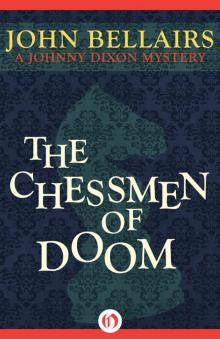 Chessmen of Doom
Chessmen of Doom Secret of the Underground Room
Secret of the Underground Room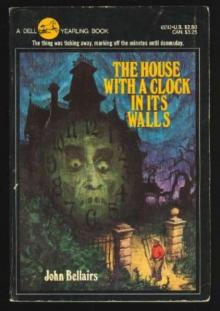 The House With a Clock in Its Walls
The House With a Clock in Its Walls The Vengeance of the Witch-Finder
The Vengeance of the Witch-Finder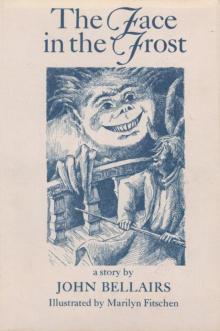 The Face in the Frost
The Face in the Frost Revenge of the Wizard's Ghost
Revenge of the Wizard's Ghost Spell of the Sorcerer's Skull
Spell of the Sorcerer's Skull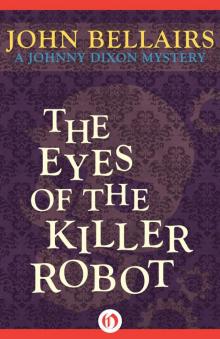 Eyes of the Killer Robot
Eyes of the Killer Robot Mummy, the Will, and the Crypt
Mummy, the Will, and the Crypt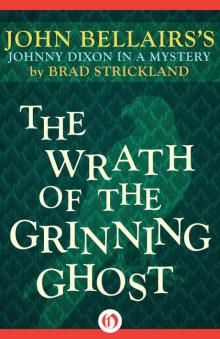 Wrath of the Grinning Ghost
Wrath of the Grinning Ghost The Mansion in the Mist
The Mansion in the Mist The Doom of the Haunted Opera
The Doom of the Haunted Opera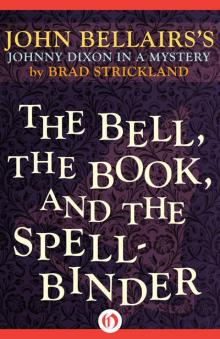 The Bell, the Book, and the Spellbinder
The Bell, the Book, and the Spellbinder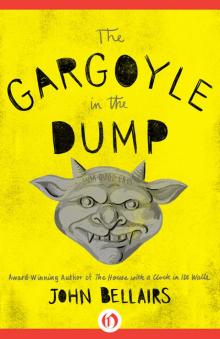 The Gargoyle in the Dump
The Gargoyle in the Dump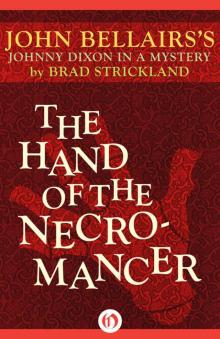 The Hand of the Necromancer
The Hand of the Necromancer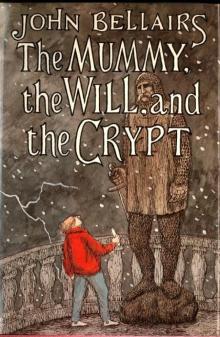 The Mummy, the Will, and the Crypt
The Mummy, the Will, and the Crypt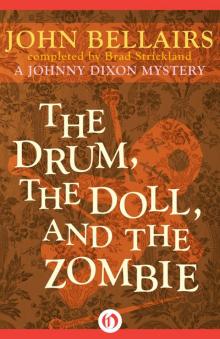 Drum, the Doll, and the Zombie
Drum, the Doll, and the Zombie The Specter from the Magician's Museum
The Specter from the Magician's Museum The Letter, the Witch, and the Ring
The Letter, the Witch, and the Ring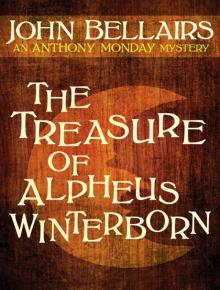 The Treasure of Alpheus Winterborn
The Treasure of Alpheus Winterborn The Dark Secret of Weatherend
The Dark Secret of Weatherend The Figure in the Shadows
The Figure in the Shadows